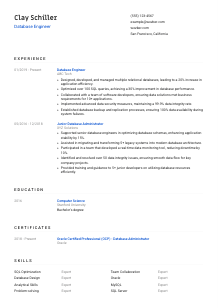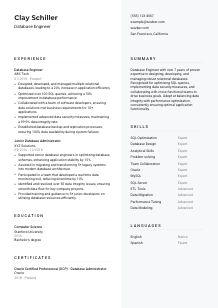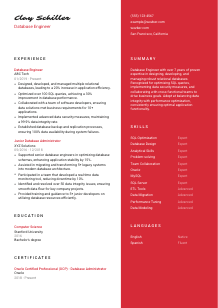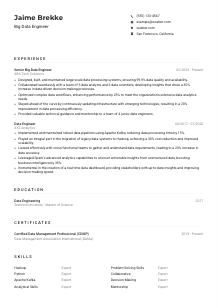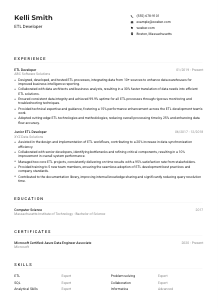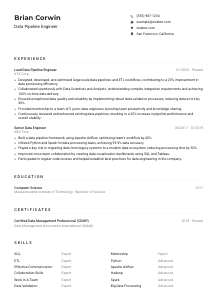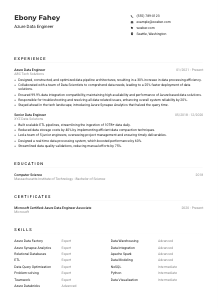Database Engineer CV Example
Mastering the art of data, but your CV feels unindexed? Dive into this Database Engineer CV example, structured with Wozber free CV builder. Learn how to curate your relational savvy to meet job criteria, making sure your professional journey and tables join seamlessly!
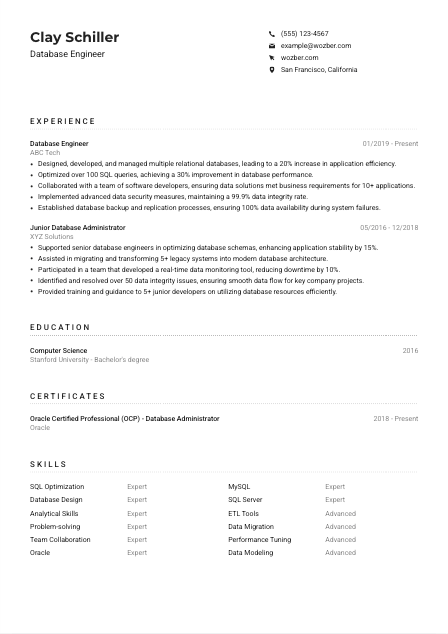
How to write a Database Engineer CV?
Greetings, future Database Engineer visionary! In the realm of data and databases, shaping a CV that not only stands out but also resonates with your dream role's specifics is essential to opening doors to new opportunities. With Wozber's free CV builder at your side, navigating through the complexities of creating an ATS-compliant CV becomes a thrilling adventure rather than a daunting task.
This guide is meticulously crafted to empower you to sculpt your CV into a narrative that not only meets but exceeds the expectations for a Database Engineer position. Ready to embark on this journey and transform your professional document into a compelling story?
Personal Details
Kickstarting with the Personal Details might seem straightforward, but it's the cornerstone of your professional introduction. Follow these steps to align this section brilliantly with the Database Engineer position, ensuring it lays the perfect first impression.
1. Present Your Name with Prominence
Begin with your name; it's the banner under which your entire professional saga unfolds. Embrace a font that's professional and distinguishable, granting your name the spotlight it deserves at the top of your CV.
2. Job Title Aligns Your Aspiration
Directly below your name, mirror the job title you're vying for. This not only shows your targeted ambition but also aids in establishing a direct connection with the role. For example, labeling yourself as "Database Engineer" aligns seamlessly with the position in question.
3. The Essentials: Contact Information
Your contact information is critical. Ensure your phone number is one you regularly use. The email should embody professionalism; a combination of your first and last name is typically a safe bet. This demonstrates attention to detail, a crucial trait for a Database Engineer.
4. Location, Location, Location
The specified location of "San Francisco, California" in our CV example highlights readiness and eliminates any employer guesses regarding relocation. Matching the job location instantly furthers your candidacy from a logistical standpoint.
5. A Digital Handshake: Professional Profiles
In today's digital age, adding a LinkedIn profile or personal portfolio website can serve as an extension of your CV. Ensure it's polished and echoes the narrative of your ATS-friendly CV, allowing employers to delve deeper into your professional saga.
Takeaway
The Personal Details section is your professional greeting; it sets the tone for the narrative ahead. By making it pristine, precise, and aligned with the Database Engineer role, you've already begun to state your case convincingly. Think of it as laying down the red carpet for your skills and experiences to shine.





Experience
For a Database Engineer, the Experience section is where your technical prowess takes center stage. Let's guide you on tailoring this section to not just list your roles, but to narrate your journey in a way that resonates with the job at hand.
- Designed, developed, and managed multiple relational databases, leading to a 20% increase in application efficiency.
- Optimised over 100 SQL queries, achieving a 30% improvement in database performance.
- Collaborated with a team of software developers, ensuring data solutions met business requirements for 10+ applications.
- Implemented advanced data security measures, maintaining a 99.9% data integrity rate.
- Established database backup and replication processes, ensuring 100% data availability during system failures.
- Supported senior database engineers in otimizing database schemas, enhancing application stability by 15%.
- Assisted in migrating and transforming 5+ legacy systems into modern database architecture.
- Participated in a team that developed a real‑time data monitoring tool, reducing downtime by 10%.
- Identified and resolved over 50 data integrity issues, ensuring smooth data flow for key company projects.
- Provided training and guidance to 5+ junior developers on utilizing database resources efficiently.
1. Dissect the Job Requirements
Firstly, dissect the job description like a complex database schema. Identify keywords and phrases that describe your desired role's responsibilities, such as "database design," "SQL optimisation," and "data security measures." This step ensures your experience aligns with what's sought.
2. Structure Reflects Clarity
Follow a reverse-chronological order to list your experiences, shining a spotlight on your most recent and relevant roles first. This order is not only ATS-friendly but intuitively matches how hiring managers assess a candidate's growth trajectory.
3. Highlight Achievements with Precision
In your bullet points, detail accomplishments that mirror the job's needs. For instance, note any instances of "optimised database performance" or "enhanced data security," using quantifiable outcomes to illustrate your impact. This specificity turns a list of duties into a compelling narrative of achievements.
4. Numbers Tell the Story
Wherever possible, quantify your achievements. Whether it's by stating a "30% improvement in database performance" or the number of databases you've managed, numbers provide a measurable impact of your contributions, offering a tangible grasp of your capabilities.
5. Relevance Is Key
Ensure every point in this section directly correlates with the Database Engineer role. Extraneous details, no matter how impressive, can dilute your message. Aim for precision and relevance – qualities quintessential in the database world.
Takeaway
The Experience section is your battleground, where you showcase your victories and expertise. By tailoring each point to reflect the job description and emphasizing measurable achievements, you're not just a candidate; you're the solution to their needs. Let each bullet point be your ally, convincingly making the case for your appointment.
Education
Your educational background in Computer Science sets the foundation for your expertise in database engineering. Here's how to ensure your Education section accentuates not just your qualifications but your dedication to the craft.
1. Identify Required Qualifications
Start by pinpointing the educational qualifications listed in the job description, such as the need for a "Bachelor's degree in Computer Science." Showcasing your matching degree upfront aligns your academic background with the role's requirements.
2. Structure for Clarity
Maintain a clear and organized presentation of your educational background. List your degree, field of study, institution, and graduation year in a manner that's easy to scan. This straightforward structure is appreciated both by human eyes and ATS systems.
3. Highlight Pertinent Degree Details
If your degree directly matches the job requirements, make it a highlight. For instance, a "Bachelor's degree in Computer Science from Stanford University" speaks volumes about your relevant foundational knowledge and should be prominently displayed.
4. Relevant Courses and Achievements
For those early in their career, or if the role is specialized, mentioning specific relevant courses or achievements might give you an edge. This can illustrate not just your knowledge, but your enthusiasm and focus in the field of database engineering.
5. Additional Educational Milestones
Any additional scholastic achievements, like honors, scholarly publications, or significant projects related to database engineering, can add weight to your CV. However, gauge the level of the role to ensure these details enrich rather than clutter your narrative.
Takeaway
While the Education section may seem straightforward, it's an opportunity to underscore the solid foundation of knowledge upon which your skills are built. Highlighting how your educational background aligns with the job's requirements sets you apart as a candidate whose expertise is grounded in a relevant academic understanding.
Certificates
In a field as dynamic as database engineering, certifications serve as badges of honor, showcasing your commitment to staying at the forefront of technological advancements. Here's how to choose and present your certificates to shine a light on your expertise and dedication.
1. Align with Job Necessities
Even though the job description might not specify certifications, listing ones relevant to the role, like an "Oracle Certified Professional (OCP) - Database Administrator" certificate, signals your proficiency and commitment to professional development.
2. Choose Pertinently
Highlight certifications that resonate most with the job's demands. This prioritization ensures that the hiring manager immediately sees the most relevant information, acknowledging your preparation and fitness for the role.
3. Accuracy of Dates Matters
Include the acquisition or expiration dates for your certifications, especially if they are recent or require renewal. This showcases not only your current qualifications but also your ongoing dedication to staying updated in your field.
4. Stay Proactively Updated
The database field evolves rapidly. Maintain a commitment to learning and certifying your skills in new technologies and methodologies. Regular updates to your certifications not only enhance your expertise but also signal your drive to grow.
Takeaway
Your certifications are a testament to your skills and ongoing professional development. By strategically selecting and presenting these certifications, you're underscoring your commitment to excellence in the database engineering field. Let each certificate be a beacon of your dedication and capability.
Skills
In the world of database engineering, your skills are your most prized possessions. Crafting a Skills section that articulates your technical and analytical prowess is crucial. Let's navigate through cataloging your skills in a way that resonates deeply with your target role.
1. Decipher the Job's Language
Kickstart by extracting both explicit and implicit skills from the job posting. Terms like "SQL optimisation," "database design," and "performance tuning" are not just jargon; they're the keys to framing your skills in the language of your potential employer.
2. Align Skills Precisely
Match your own skill set with those listed in the job description. Prioritizing skills like "SQL Optimisation" and "Database Design" early in your list tells the hiring manager that you're equipped with the precise tools needed for the job.
3. Structure with Purpose
Craft a curated list rather than an exhaustive one. Focusing on the most relevant and advanced skills you possess not only showcases your expertise but also maintains the hiring manager's attention on your most compelling attributes.
Takeaway
The Skills section is your personal showcase, illuminating your technical expertise and problem-solving prowess. Approach it as an opportunity to vividly demonstrate to the hiring manager why you're not merely a candidate but a compelling solution to their needs. Wear your skills as badges of honor and keep advancing them with every project and opportunity.
Languages
In the global field of database engineering, the ability to communicate across linguistic barriers can significantly enhance your professional appeal. Here's how to align your language skills with the job requirements and showcase your global readiness.
1. Scrutinize Job Language Requirements
Begin by identifying any language requirements or preferences stated in the job post. For example, "English proficiency" is non-negotiable for our targeted role, making it essential to highlight your fluency or native proficiency in English.
2. Prominently Feature Essential Languages
If the job explicitly requires certain language skills, ensure they are listed at the very beginning of your languages section, establishing immediately that you meet this fundamental criterion.
3. Broaden Your Linguistic Portfolio
Listing additional languages you are proficient in can set you apart, demonstrating both versatility and the ability to function in an increasingly global field. This can be particularly valuable for roles that emphasize teamwork or client interaction across different regions.
4. Honest Appraisal of Proficiency
It's crucial to accurately represent your language proficiency levels. Whether it's "Native," "Fluent," "Intermediate," or "Basic," clarity here helps set realistic expectations and showcases integrity in your self-assessment.
5. Role's Global Dimension
Consider the geographic scope and cultural diversity of the role. If the position involves interfacing with global teams or clients, emphasizing your multilingual capabilities could significantly bolster your candidacy.
Takeaway
Your ability to navigate different languages isn't just a line on a CV; it's a testament to your adaptability and global perspective. Even if proficiency in additional languages isn't a requirement, it's a distinguishing factor that illustrates your readiness for a diverse and evolving professional landscape. Embrace your linguistic strengths as a powerful component of your professional identity.
Summary
Crafting an engaging summary is like setting the stage for your professional narrative. This section offers a concise yet compelling overview of your expertise and suitability for the Database Engineer role. Here's how to make it resonate.
1. Essence of the Role
Start by absorbing the essence of the job posting. Identify the core responsibilities and desired traits for a Database Engineer, allowing you to position yourself as the perfect fit right from the beginning.
2. A Strong Opening
Introduce yourself with a statement that encapsulates your professional identity and primary strengths. For instance, positioning yourself as a "Database Engineer with over 7 years of expertise" immediately conveys your experience level and area of specialization.
3. Match Key Requirements
Weave in a summary of your most relevant skills and achievements, directly addressing the key requirements of the job. Mentioning your prowess in "SQL optimisation," "database performance tuning," and "collaboration with cross-functional teams" directly signals your competence and alignment with the role's expectations.
4. The Art of Brevity
Keep your summary concise and impactful. Aim for 3-5 lines that hook the hiring manager's attention, compelling them to dive deeper into your CV. This is your elevator pitch; make every word count.
Takeaway
Your Summary is more than an introduction; it's your professional headline, your hook, and your promise. Tailoring this section to meld seamlessly with the job requirements elevates your CV from a mere application to a statement of fit. It's your first impression, make it resonate with your future employer's needs and your unique capabilities.
Launching Your Database Engineer Journey
Congratulations on navigating through the intricate process of customizing your Database Engineer CV. With these insights and Wozber's free CV builder at your disposal, you're well-equipped to create an ATS-compliant CV that speaks eloquently of your skills, achievements, and readiness for your dream role. Remember, your CV is your narrative, a vibrant reflection of your professional journey. Fine-tune it, infuse it with your unique essence, and let it be a gateway to the opportunities that await.
The data realm awaits your expertise. Shine bright and reach for the stars!

- Bachelor's degree in Computer Science, Information Systems, or a related field.
- Minimum of 5 years of experience in database design, development, and administration using relational databases such as MySQL, Oracle, or SQL Server.
- In-depth knowledge of SQL and the ability to write and optimize complex queries, stored procedures, and triggers.
- Experience with data migration, transformation, and scripting, as well as ETL tools.
- Strong analytical and problem-solving skills with a focus on data integrity and performance optimization.
- English proficiency is a key skill for this position.
- Must be located in or willing to relocate to San Francisco, CA.
- Design, develop, and manage relational databases, data models, and data schemas for various applications and systems.
- Monitor and optimize database performance and resource utilization to ensure optimal functionality and reliability.
- Collaborate with software developers and data analysts to ensure database solutions meet business requirements and data needs.
- Implement and enforce data security and privacy measures in accordance with industry best practices and relevant regulations.
- Manage database backups, recovery, and replication processes to ensure data integrity and availability.





